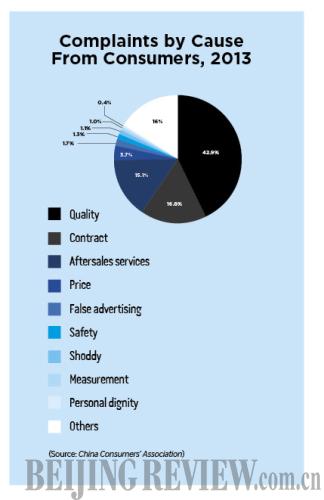|
Lastly, grievances in the express delivery industry are piling up rapidly. As remote shopping thrives, the express delivery industry is expanding its territory, and as a result, related complaints have also shot up. In 2013, complaints concerning the postal service industry numbered 13,352 cases, 61.2 percent of which were express service-related, examples of such being delayed deliveries, unreasonable compensation, and agents requesting consumers to confirm receipt before goods could be examined, especially for expensive, fragile commodities, a practice which causes great inconvenience.
As Yi noted, these allegations reflect what has happened to the Chinese market. Since online shopping has experienced explosive growth in recent years, some necessary laws and regulations have not yet been put in place, which has incubated an array of potential problems. This is not to mention the express industry, which has its roots of growth in Internet businesses.
Similarly, the expansion of the automobile industry has also been accompanied by endless consumer complaints, because improved laws and regulations have made many once-acceptable practices of auto distributors illegal.
The revised law
Jiang Tianbo, Secretary General of the CCA, said that the revised Law on the Protection of Consumer Rights and Interests would further clear the barricades on the path to safeguarding consumers' rights in the near future.
The scope of consumer rights and interests has been expanded upon in detail. Issues such as protecting personal information, improving and expanding upon present stipulations on the repair, replacement and return of commodities and services, increasing penalties for fraudulent behavior, and defending consumers' privacy, property and health rights all fall within this scope.
The duties and responsibilities of business operators have been further elaborated upon and emphasized. The law first and foremost makes it plain that business operators are obliged to recall defective products, not just automobiles, and carry the burden of proof.
Special problems arising from online shopping and personal information protection have been outlined and dealt with properly. Online vendors and financial service providers are required to offer consumers accurate and necessary information in transactions. Consumers are entitled to return goods within seven days of receipt without giving any explanations. Online transaction platform operators are now required to carry out their duties and to take on civil responsibilities such as ceasing behavior that infringes on consumer rights, eliminating the damage caused by the use of defective products , and compensating for consumers' losses.
The law has explicitly stipulated the supervisory responsibilities that administrative departments should undertake, and increased the severity of penalties on behavior that infringes on consumers' rights and interests, such as falsifying production dates, delaying or refusing to follow the orders issued by the relevant supervising departments.
The law has also made clear the nature and functions of the CCA—serving the public welfare, and placing an emphasis on the social supervision of rights and interests protection.
Now, the CCA is allowed to file collective lawsuits against companies by organizing all of the consumers who find their rights have been trampled on.
Jiang noted that the law has not only laid out how to protect consumers' rights and interests in emerging industries, but also that much had been learned from other countries in the recall of defective products and protection of consumers' personal information.
"The law has really made great progress in safeguarding consumers' rights and interests," said Jiang.
Email us at: lanxinzhen@bjreview.com

| 